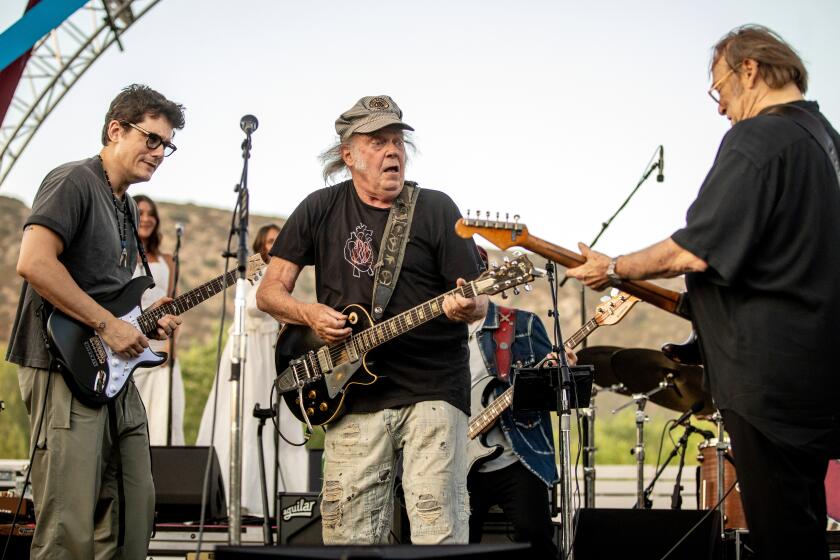A return to Bad Religion’s early days
Greg Graffin knows something about teenage rebellion. As the young singer for one of SoCal’s most prominent hard-core punk bands, Bad Religion, raging against parental control (and the global system) was his core mission in the early 1980s.
Although lyrics on the band’s new album, “True North,” still focus on political grievance and societal ills, the generational conflict he once experienced as a suburban San Fernando Valley punk has now emerged between Graffin and his own son, now 21. He’s learned to accept it.
“[Children are] fine acknowledging that they’re different from their parents, but a lot of parents today don’t want to accept the fact that there is a gap — your kids are going through a cultural milieu that you cannot understand,” Graffin said recently during a practice at the band’s rented Hollywood studio. “Your kids are going through something absolutely unique. That was probably the hardest thing for me to learn.”
TIMELINE: Grammy winners through the years
It’s not a position Graffin ever could have imagined when the band emerged in 1979 as unknown teenage punks from the West Valley. With confrontational lyrics such as “Broken homes from which they come, beer-stained dad, compliant mom / Fear and love, much despised, replaced by comfortable lies” (from 1982’s “How Could Hell Be Any Worse?” album), Bad Religion rose to become one of punk rock’s most prominent voices before going deeper into the geopolitical.
Now on its 16th album (“True North” is out this week), the band — guitarist and co-founder Brett Gurewitz, bassist Jay Bentley, guitarists Greg Hetson and Brian Baker and drummer Brooks Wackerman — finds itself mostly intact from its popular ‘90s lineup, while pulling from the past to deal with the present. At 48, Graffin is a sturdy grown-up with an impish grin, dressed in thick denim shirt and jeans. In the fall, he is a lecturer on evolutionary biology at Cornell University, decades away from the surly intellectual teen he was at the dawn of hard-core punk.
He’s active on Twitter (@DoctorGRaffin), with his feed featuring a photo of this punk lifer looking utterly professorial beside a bookcase in a suit, tie and simple black-framed glasses, and from which he fires off messages on anarchy and science, like digital echoes of his early punk songs.
“The idea of finding your way in this world was something we started writing about when we were kids,” said Graffin, who now lives in upstate New York. “Now we’re all parents and we see our kids going through the same [stuff] we went through. I thought it might be easier to observe, but it’s actually just as emotionally challenging to see it in your own children.”
Sitting beside Graffin in the dark rehearsal space crowded with gear and packing cases was Gurewitz, frequently checking his cell for news on the newborn at home. Bentley reclined cheerfully on the floor, not far from his spit-stained amplifier. The singer first met Gurewitz on the way to a 1979 Ramones concert at the Hollywood Palladium. “He picked me up in his mom’s station wagon and asked if I’m ready for a nonstop bop,” he recalled with a laugh. “Yeah, I was.”
Bad Religion itself will return April 13 to the Palladium, a site the band’s played many times through the decades — focused storms of intensity and harmony, with Hetson hopping frantically beside his guitar amp, high into the air like a tick. The band’s influence can be heard in next-generation punk acts such as Rise Against.
“[The ‘80s and ‘90s] obviously was when we were at the vanguard of the cultural zeitgeist,” added Gurewitz, 50. “We were making things happen. At some point, you keep going and hopefully your music still has something to offer, but there is a moment — Van Morrison had his moment with ‘Astral Weeks’ and ‘Moondance’ — every artist has their pinnacle. Rock music is connected to popular culture. We had our most tangible connection to our culture in that period of time.”
“True North” is a noticeable return to the short, sharp sounds of Bad Religion’s early days and such albums as “Suffer,” “No Control” and “Against the Grain.” On the new album, most songs clock in at about two minutes; “Vanity” barely makes it through 62 seconds.
“If you look at our early records, a lot of fans have come to regard that as our classic era, for better or for worse,” said Graffin, sitting near the drum kit on a small stage. “It was a real special time in our history. And we wanted to give the fans a sort of reminiscent album that culled from that era all the good qualities of it, but maybe shows some evolution in our songwriting and what we’ve developed in the last 15 to 20 years.”
Gurewitz, who is also the founder and owner of the influential indie Epitaph Records, said he was partly inspired for this album by the example of Tom Waits, who is signed to Epitaph imprint Anti-. Waits and wife-writing partner Kathleen Brennan limited themselves to songs of about three minutes for 2011’s acclaimed “Bad as Me” album, an idea Gurewitz found compelling and familiar.
“To think he was setting some guidelines for himself, to set his creative process free was really a revelation,” Gurewitz said. “That’s what we used to do. Punk rock in the beginning was a reaction to the indulgence and dissipation in the ‘70s. The spirit of rock is the distillation of angst and sexual energy and protest and rebellion. Let’s boil it down to its most essential kernel.”
Other songs touch on both global and ground-level issues. The song “Robin Hood in Reverse,” written by Gurewitz, was largely inspired by the Occupy movement and the separation of rich and poor, though the title came to him after witnessing a successful musician try to avoid paying a recording engineer.
One of the new album’s catchier songs has a title unprintable here, but it has been released as the album’s first single. (In 2010, Cee Lo Green had a similar issue with a potential hit song, ultimately cleaned up and re-titled as “Forget You.”) For Bad Religion, it was decided to follow the hip-hop model and simply blank out the word. It’s now in rotation on KROQ-FM (106.7), while the uncensored version is a top-10 single in Germany.
“It was a really catchy tune, and I thought, ‘Man, the only thing that really fits right there is something we’ve never done, but we should have done,’” said Graffin. “If you look through our 260-song catalog, you can’t believe you haven’t found this title before. Those are the two words that kept coming up as I was humming it in my head.”
Years ago, Epitaph grew into an indie with worldwide reach, and it now offers Bad Religion essentially the same level of distribution the band once enjoyed while signed to Atlantic and Sony. “With the added benefit of a company that cares passionately about the band — because the origin of Epitaph can be traced to Bad Religion,” said Graffin, “there is a culture of caring about this band that you don’t get at any other label.”
Gurewitz left the band in 1995 to concentrate on Epitaph, but reclaimed his position as a central member and songwriter seven years later. He still doesn’t tour extensively with the band, and generally appears only at hometown shows, occasionally traveling to high-profile gigs in other cities.
Gurewitz’s bandmates don’t seem to mind. As bassist Bentley said, “I think you get a little more personal attention at Epitaph when the co-writer owns the company.”
PHOTOS AND MORE
COACHELLA: Complete 2013 lineup
THE ENVELOPE: Awards Insider
PHOTOS: Grammy top nominees
More to Read
The biggest entertainment stories
Get our big stories about Hollywood, film, television, music, arts, culture and more right in your inbox as soon as they publish.
You may occasionally receive promotional content from the Los Angeles Times.











